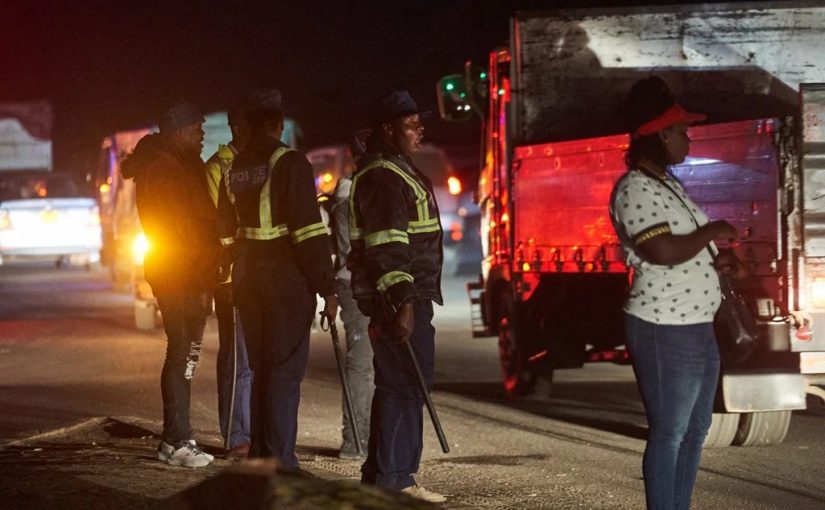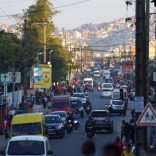Botswana economy suffers steep contraction in Q2 on diamond sector woes
UN experts urge release of Zimbabwe rights activists

FILE - Zimbabwean police dispersing people at an intersection in Chitungwiza in August 2023, to prevent what they considered an illegal gathering. [File photo: Zinyange Auntony / AFP]
UN-appointed experts Thursday urged Zimbabwe to release three rights activists they said had been tortured in detention, as the country prepares to host a key regional summit.
They named them in a statement as rights activist Namatai Kwekweza, teachers’ union leader Robson Chere and Samuel Gwenzi, a former Harare municipal councillor.
They were arrested on July 31 for demonstrating in support of jailed opposition leader Jameson Timba and other activists.
The UN experts said unidentified men had forced them off an aeroplane and held them incommunicado for eight hours.
“The three were reportedly subjected to enforced disappearance, torture and other cruel, inhuman or degrading treatment or punishment, including waterboarding”, the statement said.
They were afterwards handed over to police who informed them for the first time of the reason for their arrest: alleged “disorderly conduct” during a demonstration in July for Timba’s release.
The UN-mandated experts called the charges “baseless” and the detainees’ treatment “inexcusable”.
A court was scheduled to rule Friday on whether to release them on bail.
Zimbabwe hosts the heads of state from the 16 countries of the Southern African Development Community (SADC) on Saturday.
Global monitors Human Rights Watch and Amnesty International said Zimbabwe authorities have arrested dozens of people in the weeks leading up to the summit.
“At a time when Zimbabwe is preparing to host the SADC summit, whose values include institutions that are ‘democratic, legitimate, and effective’, it is unconscionable that these human rights defenders working to strengthen such institutions remain arbitrarily detained,” the experts said.
The experts included several “special rapporteurs” — independent rights specialists who are appointed by the UN rights council but do not speak on behalf of the United Nations.
#Zimbabwe 🇿🇼 must immediately release #HumanRights defenders who have been arbitrarily detained for over two weeks and drop charges against them, UN experts state.https://t.co/giO9JvaLI1pic.twitter.com/0xqYx3vzvw
— UN Special Procedures (@UN_SPExperts) August 15, 2024
Read the full statement below:
Geneva (15 August 2024) – The Zimbabwean authorities must immediately release human rights defenders who have been arbitrarily detained for over two weeks and drop charges against them, independent human rights experts said today.
Woman human rights defender Namatai Kwekweza, teacher and labour rights defender Robson Chere, the Secretary-General of Amalgamated Rural Teachers Union of Zimbabwe (ARTUZ), along with local councillor for Harare Ward 5, Samuel Gwenzi, were forcibly removed from a departing flight at Harare Airport on 31 July 2024.
Unidentified men escorted the three to a high-security zone within the airport and held them incommunicado for eight hours.
During this time, the three were reportedly subjected to enforced disappearance, torture and other cruel, inhuman or degrading treatment or punishment, including waterboarding.
Additionally, they were severely threatened against protesting in advance of or during the Southern African Development Community (SADC) summit scheduled for 17 to 19 August 2024 in Harare.
“The enforced disappearance, incommunicado detention and torture, followed by the arbitrary detention of these human rights defenders is inexcusable, and not only violates international human rights law but also makes a mockery of the safeguards contained in Zimbabwe’s own Constitution,” the experts said.
At around 9 PM on 31 July 2024, the human rights defenders were handed over to the Zimbabwe Republic Police at Harare Central Police Station, when they were informed, for the first time, that they were facing charges of “disorderly conduct” under section 41 of the Criminal Law Codification and Reform Act.
These charges relate to their alleged participation in a demonstration calling for the release of a detained opposition politician. Namatai Kwekweza was apparently not even in Zimbabwe at the time of the demonstration in question.
The experts said, “These baseless charges are being used as a fig-leaf to target human rights defenders and opposition voices for calling for greater democracy, human rights and accountability in Zimbabwe. At a time when Zimbabwe is preparing to host the SADC summit, whose values include institutions that are “democratic, legitimate, and effective”, it is unconscionable that these human rights defenders working to strengthen such institutions remain arbitrarily detained.”
The release of the human rights defenders on bail has been opposed by the prosecutor and a further bail hearing has been scheduled for tomorrow, 16 August 2024.
The experts have been in touch with the Government of Zimbabwe on the issue.
ENDS
The experts: Mary Lawlor, Special Rapporteur on the situation of human rights defenders; Irene Khan, Special Rapporteur on the right to freedom of opinion and expression; Gina Romero, Special Rapporteur on the Rights to Freedom of Peaceful Assembly and of Association; Aua Baldé (Chair-Rapporteur), Gabriella Citroni (Vice-Chair), Grażyna Baranowska, and Ana Lorena Delgadillo Pérez, Working Group on Enforced or Involuntary Disappearances. Special Rapporteurs are part of what is known as the Special Procedures of the Human Rights Council. Special Procedures, the largest body of independent experts in the UN Human Rights system, is the general name of the Council’s independent fact-finding and monitoring mechanisms that address either specific country situations or thematic issues in all parts of the world. Special Procedures’ experts work on a voluntary basis; they are not UN staff and do not receive a salary for their work. They are independent from any government or organization and serve in their individual capacity.













Leave a Reply
Be the First to Comment!
You must be logged in to post a comment.
You must be logged in to post a comment.